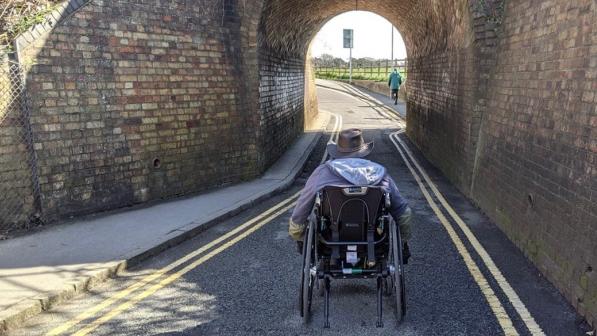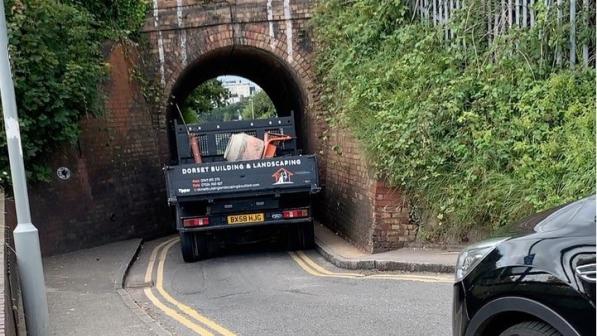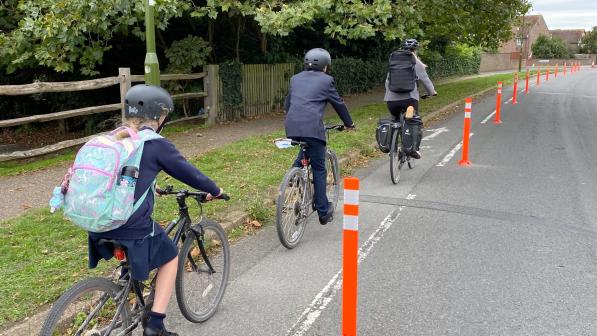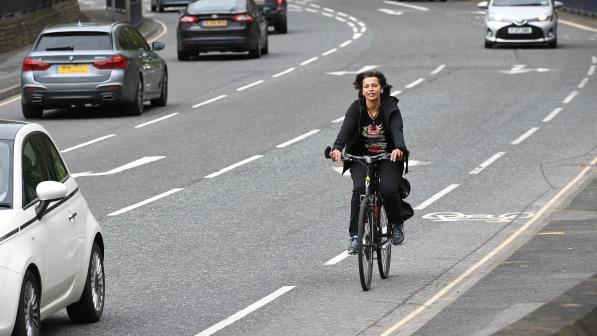Error message
How the Cyclists’ Defence Fund has been standing up for you
Two months ago, in an article about how Cycling UK’s Cyclists’ Defence Fund (CDF) stands up for cyclists, I posed a question: what would you do if you found yourself next to a driver at the traffic lights who was engrossed in conversation on his mobile phone?
Would you stop to politely remind them that they shouldn’t be on a hand-held device whilst driving? If you did, would you expect to be prosecuted for inconsiderate cycling because you'd delayed another driver for a few seconds, who then drove through a red light?
This wasn’t entirely hypothetical, because as we reported last week, that’s what happened to Cycling UK member Tom Bosanquet.
CDF funds defence – CPS drops case
Fortunately, though belatedly, sense prevailed.
When Avon and Somerset police made the decision to charge Tom, he contacted Cycling UK and through the CDF we paid his legal costs for defending the case, which was listed for trial last week. The Crown Prosecution Service (CPS) reviewed the case before the trial date, and rightly took the decision to drop the case
Of course, we can’t get involved in every legal case involving a cyclist, so why did we bother with an inconsiderate cycling case?
Well, many police forces, including Avon and Somerset, have expressly asked people to submit video evidence of offending on our roads, and that’s exactly what Tom had done previously and did this time. It’s hardly an encouragement to people to do their bit as a citizen and help the police, if the police then seem more bothered about whether a cyclist delayed a driver for nine seconds.
Prosecuting cyclists for delaying motorists also risks setting a dangerous precedent, leading to cyclists being blamed for other people’s impatience or bad driving, precisely what happened when a police officer in Essex stopped two cyclists he claimed were “causing an obstruction” and “causing people to drive carelessly”, when he clearly didn’t understand the Highway Code .
Prosecutions – public and private
Tom’s case was a public prosecution, and he was relieved that Cycling UK had his back and were there when he needed help, saying “I’ve been humbled by the support shown to me both by individuals and groups such as Bristol Cycling Campaign, and particularly grateful to Cycling UK’s Cyclists’ Defence Fund which was there to take my side and support me.”
But the CDF hasn’t just been used to defend. Back in 2016, through CDF, Cycling UK issued criminal proceedings against the driver involved in the collision which led to the death of teacher Michael Mason, who was hit from behind whilst cycling along Regent Street in London.
We brought a private prosecution because the Metropolitan Police refused to prosecute, or even refer the case to the CPS in accordance with CPS charging guidelines. That was the first ever private prosecution in England for death by careless or dangerous driving and, although the driver was eventually acquitted at trial, the case highlighted many of the issues concerning our road traffic laws which we’ve raised repeatedly through our Road Justice campaigning.
It also showed that we are, as an organisation, prepared to put our head above the parapet and fight for cycling and cyclists – which is why we have the CDF.
Donate to the Cyclists' Defence Fund
Judicial review on lanes and trails
Cyclist’s Defence Fund isn’t there just for criminal cases, with civil law and judicial reviews keeping us busy this year.
In January, West Sussex County Council finally admitted during judicial review proceedings brought by Cycling UK, that it had acted unlawfully when removing a cycle lane in Shoreham.
But bringing cases like this to the High Court is a huge endeavour, and expensive, so we can’t bring or lead on every case or challenge. Sometimes, the most effective use of CDF resources is to support others to challenge decisions, and that’s what we’ve done this year by providing advice and financial support to another superb local group, Better Streets for Kensington and Chelsea to help them pursue their judicial review of the decision the Royal Borough of Kensington and Chelsea (RBKC) took to remove the cycle lane on Kensington High Street.
RBKC are defending the claim, which is listed for trial in December. But, only this week, a long-awaited report that the borough commissioned from the Centre of London was published, which recommended more cycle lanes in Kensington and Chelsea. Hopefully, RKBC will finally see sense.
But it’s better to avoid litigation, and particularly costly judicial review proceedings, if at all possible. We’d prefer not to have to take the Secretary of State for Environment, Food and Rural Affairs (DEFRA) and Natural England to court, but the ball is in their court.
Back in August, Defra announced that £5.6 million would be allocated to improve the 197-mile Wainwright Coast to Coast route from St Bees in Cumbria to Robin Hood’s Bay on the Yorkshire coast, ahead of it becoming a National Trail in 2025. Cycling UK and BHS (British Horse Society) have written a letter before legal action to DEFRA calling on the Government to reconsider proposals that would effectively prevent people cycling or horse riding along the length of England’s next National Trail.
Despite both being prescribed organisations for rights of way consultations, neither were consulted by Natural England. If we had, we’d have put forward proposals which could have allowed the creation of a multi-user trail, with some ‘braided’ sections where the cycling and horse riding route diverts temporarily form the walked route.
We’re hoping DEFRA and Natural England will take the opportunity to consult and work towards the goal of creating a multi-user trail, avoiding further legal action.
Public space, and who can use it?
The problem we have when it comes to CDF-funded work is that there’s so much we could do, but what we can do is limited by resources. CDF is funded entirely from donations, so we have to pick our battles carefully.
Donate to the Cyclists' Defence Fund
However, there’s rarely a week goes by without me spotting something which we could get involved with. One example this week involved an 82-year-old Grimsby pensioner fined for cycling through the town centre, in breach of a public space protection order (PSPO).
We’ve long warned about PSPOs being a back door to ban activities which should be encouraged, like cycling. Five years ago through CDF, we funded and supported six local cyclists in Mansfield who challenged a proposed ban on cycling at all times of the day and night throughout a large part of Mansfield. Once again, this was a first, in this case the first ever appeal against a PSPO.
The Grimsby pensioner case involves Kingdom Securities, exposed in a Panorama programme due to various dubious practices, targetting people to stop and fine because the firm is paid per fine issued.
So, a council imposes a cycling ban via a PSPO, claiming it’s needed to tackle nuisance cycling or kids pulling wheelies in the pedestrianised area. They contract out enforcement to a company paid per fine, and the only people who are stopped are the elderly, slower or disabled cyclists pottering around doing their shopping. If there is a 'lycra lout' around (as imagined by the council), they’re never stopped, so the PSPO just becomes a cash cow which discourages responsible cycling in the town centre,
But as I have said already, we can’t pick up every case or challenge, and restricting access to public space for cycling isn’t just a problem in urban areas via PSPOs. We have it in national parks as well!
My colleague Cherry Allan has just written about the 1998 CTC protest on Dartmoor against beastly byelaws restricting cycling, a protest Cherry attended months before starting work for CTC 24 years ago.
And we’re looking at the byelaws on Dartmoor again, because last year Dartmoor National Park Authority (DNPA) consulted again on them. We believe that the criminalisation of cycling across large parts of Dartmoor conflicts with the statutory purposes of national parks. DNPA are about to publish their final proposals for byelaw amendments, but if the restrictions aren’t relaxed, that’s another potential challenge to consider – and another protest!
Of course, that takes me back to resources, and funding.
I’ve tried to summarise within this article what CDF has been doing this year, why it’s important it exists, and the breadth of work we do or might get involved in. But CDF relies on donations, so if you think any of the work or issues I’ve outlined are important to you, and you want us to keep on standing up for cycling and cyclists, please consider donating today.
Donate to the Cyclists' Defence Fund
Also, if you are involved in, or aware of, a legal case relating to cycling, whether civil or criminal, which you believe potentially poses a significant risk of injustice or may set a dangerous legal precedent, please contact us.
While we cannot guarantee to support cases, we will always review them to assess whether support is possible and whether we believe our support could help improve the safety of all cyclists or enable more people to cycle.



